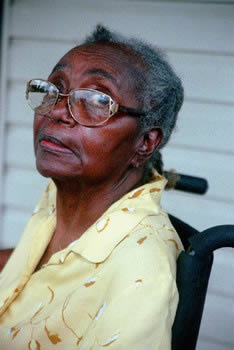Women Bear Brunt of Aging Boom
Black Community Hit Particularly Hard
By Debera Carlton Harrel, Seatle Post Intelligencer
February 18, 2006

A nationwide population boom of elderly citizens is hitting the African American community hard, with women bearing the brunt, state and local health care experts said yesterday. "Black older people need help; we haven't gotten the attention of other groups," said Margaret Boddie, program manager for the African American Elders Project, funded by the city of Seattle and run by Catholic Community Services."They're alive, they're living longer, but they're not living well," Boddie said yesterday at a community forum, "The Plight of the Older Black Woman," at the University of Washington School of Social Work. The forum, which drew about 100 people, was hosted by the African American Elders Project.
Maxine Hayes, state health officer for the Washington State Department of Health and keynote speaker, told the gathering that while society is "not doing well with our elderly population," the health care system is particularly failing African American women. She said African American women outlive men, then are left alone with untended medical problems. "These women are the backbone of our communities," Hayes said. "They need affordable care, accessible care and competent care."
Hayes said elderly African American women have survived the Great Depression, World War II, segregation and "carried an extra burden" as family caregivers in the black community. It should be time for social payback, speakers said, but instead they are suffering further. One in four African American women older than 65 now has diabetes. They also have higher rates of complications from diabetes, such as amputation, blindness and kidney failure. Boddie said the African American Elders Project is making a difference, serving 159 elderly citizens in central and southeast Seattle. Boddie, who came out of retirement to lead the project, is seeking King County funding to expand the project's reach. She said the project is limited to Seattle, although many more potential clients live in South King County.The project has helped address the needs of frail, older African Americans by connecting them with "people who care," lifting their spirits and health and ending their isolation, Boddie said.
The project's trained social workers and a public health nurse visit the elderly, identify medical and psychological problems and help them with medications, medical insurance, utilities, transportation, doctor visits and other concerns.
Boddie, noting that most of the elderly are women who either have no family or whose families are unable to help, said the project has helped reduce the number of costly emergency room visits. Hayes urged policy-makers and the public to take notice of a topic "that deserves more attention than people are giving it." To do so, she said, would be an investment in "not just the African American community, but the community as a whole." Hayes said the failure to adequately address the health care needs of aging African Americans will only compound a growing demographic problem -- and increase health care costs to all. The elderly -- people older than 65 -- are the fastest-growing group nationwide.
By 2020, the number of people in Washington who are 65 and older will make up 16 percent of the state's population -- nearly doubling to 1.2 million. That increase is expected to have the biggest effects on the state's most populous counties -- King and Pierce. The majority of African Americans, Hayes added, live in those two counties.
Hayes said racial bias, poverty, lack of public awareness and an older generation's distrust of government all are reasons to step up health care efforts. But she and others also urged the African American community to be more proactive in guarding their own health against heart disease, obesity and other medical problems.



